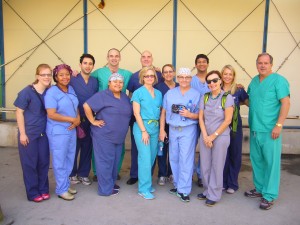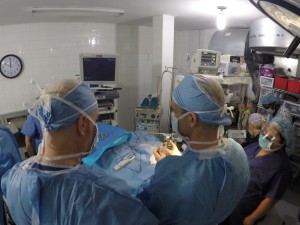The Inside Scoop: A medical mission hits close to home

This past December, I had the opportunity to accompany a pediatric neurosurgery team from Children’s Memorial Hermann Hospital and Mischer Neuroscience Institute to Port au Prince, Haiti. During the five-day trip, our team performed an incredible 25 surgeries. As a medical student and someone personally affected by hydrocephalus, the most common condition they treat during these trips, it was an extremely rewarding experience.
Our Houston program to bring pediatric neurosurgical care to Haiti began through Project Medishare, a Miami based organization that leads multiple health-centered projects in Haiti. This program also works in conjunction with the Foundation for International Education in Neurological Surgery, which facilitates neurosurgery-related volunteer efforts in several developing countries. Our team is one of several, including Miami Children’s Hospital, St. Louis Children’s Hospital and others, which alternate sending teams to Haiti to provide much needed neurosurgical care there.
Haiti is the poorest country in our part of the world and with a population of about 10 million people it does not have any trained pediatric neurosurgeons. Hydrocephalus, an abnormal accumulation of cerebrospinal fluid within the brain, is the most common reason for neurological surgery in the pediatric population and the most common condition they treat during these trips to Haiti. While hydrocephalus is incurable, it is highly treatable with neurosurgical intervention. Before programs such as this one though, children in Haiti affected by hydrocephalus went untreated and suffered the debilitating and sometimes deadly results of this condition.
In addition to myself, the team consisted of seven physicians and four operating staff members – including Dr. David Sandberg, chief of pediatric neurosurgery at Mischer Neuroscience Institute and Children’s Memorial Hermann Hospital and an associate professor in the Vivian L. Smith Department of Neurosurgeryand the Department of Pediatric Surgery; Dr. Manish Shah, clinical assistant professor of neurosurgery; Dr. Maria Matuszczak, professor and director of pediatric anesthesia; Dr. Allison Keyser, clinical assistant professor of anesthesiology; neurosurgery residents Drs. Sebastian Villarreal and Sean Meiner; anesthesiology resident Dr. Ashley Upton; operating room nurses Linda Mobley, RN, and Dorothy Serralles, RN; and surgical technologists Katrina Meshell, RN, and Angelita Maclao, CST.
I was honored to be the only medical student amid this talented team of individuals and the first medical student Dr. Sandberg had ever invited to go. It was a short, fast-paced trip and when it comes to neurosurgery there isn’t much a medical student is able to do but considering my involvement with the hydrocephalus community Dr. Sandberg decided to give me the opportunity to see first-hand the effects of untreated hydrocephalus in developing nations such as Haiti.
I had gotten to know Dr. Sandberg through my own volunteer work with the Hydrocephalus Association. During my second year of medical school, with the help of the Hydrocephalus Association, Mischer Neuroscience Institute and Dr. Sandberg, I started a hydrocephalus support group at Children’s Memorial Hermann Hospital. In addition, I have volunteered with the annual Houston Hydrocephalus Association WALK since the inaugural Houston walk in 2012, in which Children’s Memorial Hermann Hospital and Mischer Neuroscience Institute play an active role.
My own experiences living with congenital hydrocephalus played a significant part in my decision to pursue an MD/PhD and they continue to have an impact on my overall outlook on medicine. As both an aspiring physician and a patient, I have been given a unique perspective. This trip gave me a deeper appreciation of not only what we can do as health care providers in the United States compared to countries such as Haiti but also what can be done for us as patients.
Living with hydrocephalus is not without its challenges, even in the U.S., but I am fortunate to have multiple experienced neurosurgeons just a phone call away and to be cared for at a comprehensive neuroscience center. I was reminded of just how lucky I am to have this care in such close proximity this past March when I ended up having my fifth hydrocephalus-related neurological surgery. It is sobering to think that I am who I am today thanks in part to the health care I have available to me simply because of the country in which I live.
I definitely “caught the medical mission trip bug” as a few in the group called it. I look forward to accompanying the team to Haiti again this December and eventually organizing trips such as this one once I complete my training.
-Jamie Mae Wright, is a fourth-year MD/PhD student. The Inside Scoop is an occasional feature that allows McGovern Medical School community share news of interest.
Full article on The Inside Scoop
